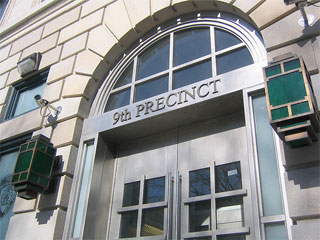Community Councils: Your Chance to Put Street Safety on NYPD’s Agenda
How many motorists, hurtling down city streets at deadly speeds, have prompted you to ask, "Why is this allowed?" When bikes gets stolen, again and again, do you wonder why there isn’t a system in place to discourage theft? How come no one ever seems to get a ticket for running a red light?
 Photo: Wikipedia.
Photo: Wikipedia.Thinking about street safety and traffic enforcement in New York City can get frustrating in a hurry, but there’s a good way to bring these types of concerns to NYPD’s attention: attend community council meetings, ready to ask questions. These are public meetings that every precinct in the city holds every month. Earlier this week, I went to one for the first time — at my local precinct, the Ninth, in the East Village — and it dawned on me that many more New Yorkers should be attending these crucial functions.
Here’s a quick overview of what community council meetings are like, what happened at the first one I attended, and what to expect if you start going to meetings at your precinct.
What Do Community Council Meetings Have to Do With Livable Streets?
Reckless drivers are a constant threat in my neighborhood, and I wanted to
learn how police were dealing with this important issue of public
safety. Since red light cameras have been shown to reduce violent crashes at
intersections, I asked if the Ninth Precinct would be
assigned a camera at the intersection of East Houston and Avenue A,
ranked one of New York’s most dangerous.
Officers replied that red-light cameras were in use on East Houston
Street, but an audience member disputed the existence of any cameras on
Houston east of First Avenue, citing an online database which maps
traffic cameras nationwide. The Traffic Intelligence Officer,
Joe Simonetti, explained that two red-light cameras are operating on
East Houston in the Ninth Precinct (at First Avenue and Allen Street), but
he conceded no cameras were in use between First Avenue and Avenue D.
Simonetti concluded that placement of New York City’s 50 new red-light
cameras, authorized last year by Albany, was ultimately up to the DOT, but he added there was no reason
to think that data on the city’s most dangerous intersections wouldn’t be
taken into account. After the exchange, the Community Board 3 district manager gave me her card
and told me she’d like to put the red-light camera issue on the agenda
for CB 3’s transportation committee meeting on February 10.
Who Can Attend?
You can attend any precinct’s community council meeting. You don’t have to live in the precinct.
The NYPD posts the dates of each precinct’s community council meetings online (you can look them up here), and there’s no need to register. Just show up, sign in, and ask your questions. No one will ask for ID.
The meetings are held once a month, usually on the same day (such as "the third Tuesday"). Meetings usually start at 7 p.m. You’ll want to call a day in advance, though, since information on the web is sometimes wrong.
Who’s There?
At the Ninth Precinct meeting I attended, officers representing various departments introduced themselves to the crowd, as did civilian members of the community council. In attendance: the precinct’s traffic intelligence officer, commanding officer, community affairs officer, and the lieutenant for special operations.
What Good Will It Do?
Attendees, many from the media, are taking notes, and the officers know this. A serious grievance voiced at the meeting is public record, and will garner attention. Community board managers often attend these councils and look for topics to discuss at their upcoming meetings, and you may be asked to discuss your concerns at a future CB meeting.
What Will I Learn?
You’ll meet community leaders, and learn useful tips. With bicycle infrastructure exploding, officers in the Ninth seem to be taking bikes more seriously. After one man complained that cops couldn’t do anything about his stolen bike, a lieutenant stepped forward to ask if the man had registered his bike with the precinct. Registering a bike with the precinct is free, the lieutenant explained, and the serial number engraved on the bike’s underside will make the property easier to track, if stolen. If registered bikes became the rule, they would become much less appealing to thieves.
Community council meetings weren’t on my radar until recently, but now I’m looking forward to the next one, to asking more questions, and bringing more livable streets issues to light.